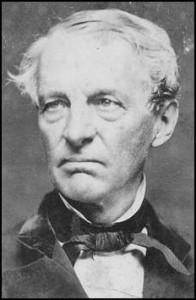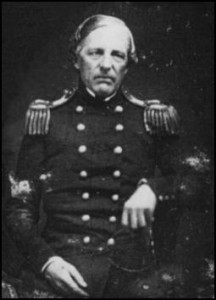Confusing Times
On March 11, 1861 The New-York Times published some commentary by OBSERVER, The Times’ Washington correspondent. As part of his article OBSERVER contrasts the actions of Samuel Taylor, who resigned as U.S. Adjutant General because of his southern sympathies, with the actions of southern men who have not yet resigned their U.S. positions (The New York Times Archive):
WASHINGTON, Sunday, Feb. 10, 1861. …
The late Adjutant-General, COOPER, who, though a Northern man, has felt himself called upon to resign his position, is a brother-in-law of Senator MASON, of Virginia. It is to be presumed that the influence of the latter over his military kinsman has induced him to take this step. If Gen. COOPER felt that he could no longer be true to the flag of his country, after the defeat of his party, he is, at least, to be commended for resigning, instead of betraying, as did FLOYD, TWIGGS, and others. But if COOPER’S conscience would not allow him to pretend to serve a Government which he abhors, what must we think of MASON’S? May not a Senator betray and play into the hands of the enemy, as well as an Army officer? That is a very strange sort of reasoning which satisfies such men as MASON, HUNTER, CLINGMAN and WIGFALL, that they may with a good conscience hold a place in the legislative councils of a country which they are endeavoring to destroy. I like much better the sense of honor which prompted COOPER, the “Northern man with Southern principles,” to resign a post to which he felt he could not be faithful, than that of these Southern men, who pretend to stand upon chivalrous punctilios, while legislating at Washington for the benefit of the Southern Confederacy.
Samuel Cooper was born in New Jersey and married a Virginian, Sarah Maria Mason. Cooper was a good friend of Jefferson Davis. He’s an example of the decision-making people had to do during the secession crisis and after.
Cooper resigned his position as Adjutant General of the U.S. Army on March 7, 1861. On March 16th he was made a general in the Confederate army. He served as Inspector General.
From the Wikipedia link:
After the war, Cooper was a farmer at his home, Cameron, near Alexandria, Virginia. His house had been taken over by the U.S. government during the war and turned into a fort, but he was able to move into what had been an overseer’s house. Due to his age Cooper earned a meager living. On August 4, 1870, Robert E. Lee, on the behalf of other former Confederates, sent Cooper $300. Lee wrote to him saying, “To this sum I have only been able to add $100, but I hope it may enable you to supply some immediate want and prevent you from taxing your strength too much.” Samuel Cooper died at his home in 1876, and is buried there in Christ Church Cemetery.



“Samuel Cooper was born in New Jersey and married a Virginian, Sarah Maria Mason.” Samuel Cooper was not born in New Jersey — he was born in Dutchess County, NY. His birth is recorded in the parish records of Trinity Episcopal Church in Fishkill, Dutchess County, NY. The household of his father, Samuel Cooper, is found in the 1790 and 1800 censuses for Fishkill; by 1804, the family had moved to New York City.
This error may have emanated from Appleton’s Cyclopedia (1888), which gives Cooper’s birthplace as Hackensack NJ. He may have been born in New Hackensack, which was a hamlet of Fishkill.
Thank you for that correction, Cathy. If I got that misinformation from Wikipedia, it looks like it’s been corrected now. Thanks again.